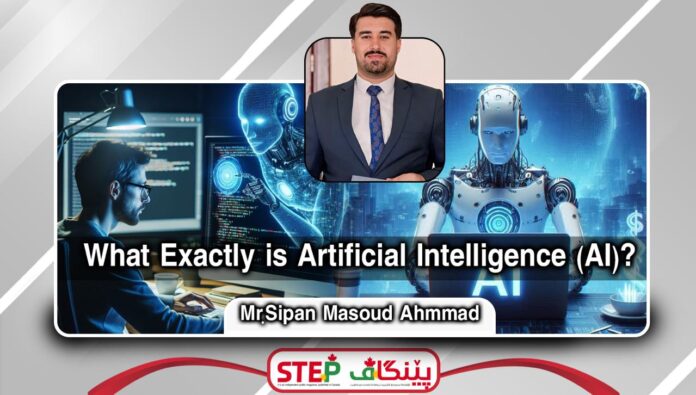Mr. Sipan Masoud Ahmmad
English Teacher
Computer Skills Trainer
1. What Is Artificial Intelligence?
Artificial Intelligence, or AI, is essentially about teaching machines to mimic human-like thinking. Imagine a computer that doesn’t just follow pre-programmed instructions but actually learns from experience — that’s AI in a nutshell.
It’s Everywhere
From voice assistants like Siri and Alexa to recommendation systems on Netflix and Amazon, AI quietly powers many of the tools we use every day.
Not Just Robots
While robots often come to mind, AI is more about software algorithms that analyze data, recognize speech, or even drive cars autonomously.
The Brain Behind It
AI uses techniques like machine learning (where systems improve with data) and neural networks (which mimic how our brains process information).
Fun Thought: Ever wondered how your phone’s keyboard predicts your next word so accurately? That’s AI learning from your typing habits over time!
2. How Does AI Actually Work?
AI’s magic lies in its ability to process massive amounts of data and find patterns. Here’s a breakdown of how it works:
Step 1: Data Collection
AI systems need tons of raw data — text, images, numbers, you name it. The more data, the better they learn.
Example: Facial recognition AI studies millions of photos to identify faces accurately.
Step 2: Training the AI
This is where machine learning comes in:
Supervised Learning: The AI learns from labeled data (e.g., spam emails marked as “junk”).
Unsupervised Learning: It finds hidden patterns in data without labels (e.g., grouping customers by shopping habits).
Reinforcement Learning: The AI improves through trial and error, like a self-driving car navigating traffic.
Step 3: Making Decisions
Once trained, AI can:
Predict outcomes (e.g., stock market trends)
Automate tasks (e.g., chatbots handling customer service)
Even create content (e.g., AI-generated art or music)
Real-World Analogy: Think of AI like a chef who perfects a recipe over time — the more dishes they cook (data), the better they get.
3. How Are We Benefiting from AI Right Now?
AI isn’t some distant future tech — it’s already transforming lives. Here’s how:
A. Everyday Convenience
Smart Assistants: Alexa, Google Assistant, and Siri answer questions, set reminders, and control smart homes.
Personalized Recommendations: Spotify suggests songs, Amazon recommends products — all thanks to AI analyzing your preferences.
B. Revolutionizing Industries
Healthcare: AI helps detect diseases (like cancer) earlier and accelerates drug discovery.
Finance: Banks use AI to spot fraud and assess loan risks in seconds.
Transportation: Self-driving cars (Tesla, Waymo) and optimized traffic systems reduce accidents and congestion.
C. Boosting Creativity & Productivity
Content Creation: Tools like ChatGPT and DALL·E assist in writing, design, and even video editing.
Work Automation: AI handles repetitive tasks (data entry, scheduling), freeing humans for creative work.
D. Future Possibilities
Climate Solutions: AI models predict weather patterns and optimize energy use.
Space Exploration: NASA uses AI to analyze planetary data and pilot rovers on Mars.
Cautionary Note
With great power comes responsibility. AI raises ethical questions — privacy concerns, job displacement, and bias in algorithms need to be addressed thoughtfully.
Final Thoughts
AI isn’t just a tech buzzword — it’s a tool reshaping how we live, work, and innovate. Whether it’s making our daily routines easier or tackling global challenges, its potential is huge. But like any powerful tool, it’s up to us to guide its development responsibly.





